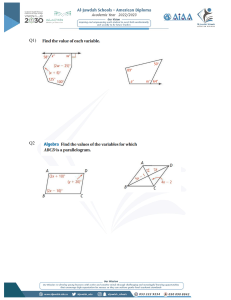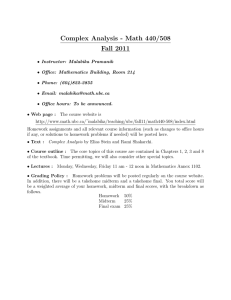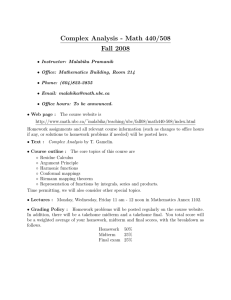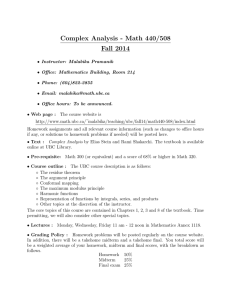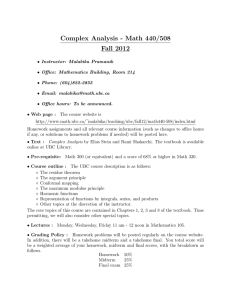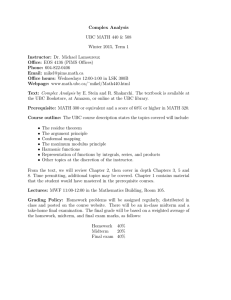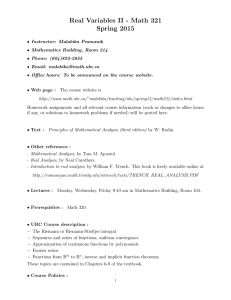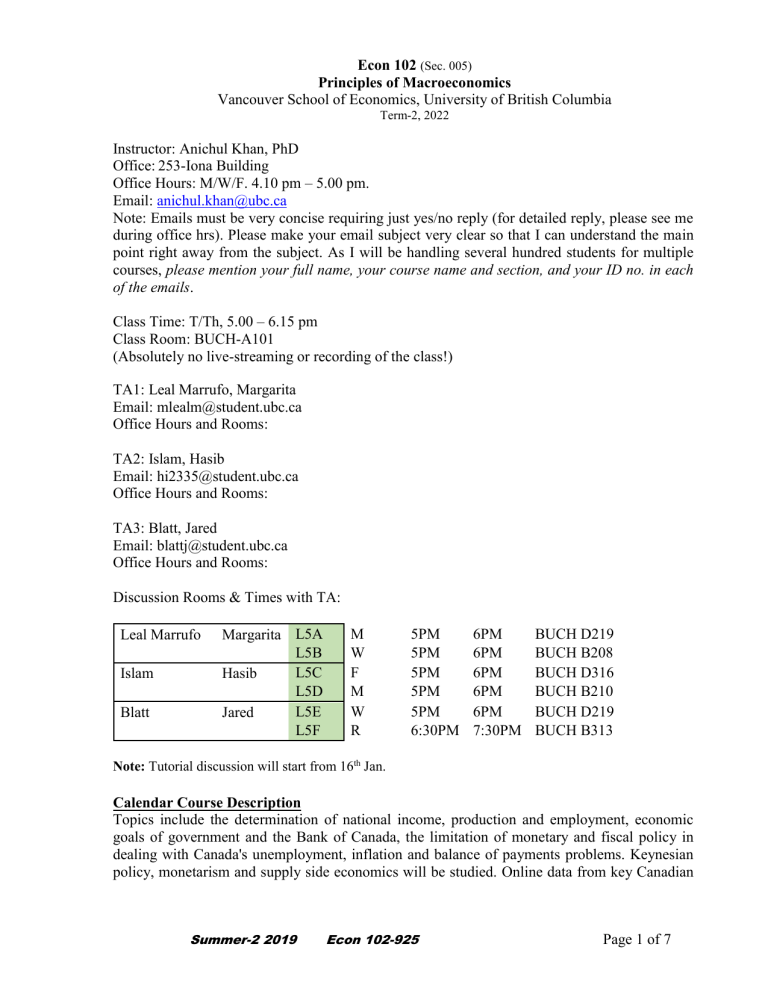
Econ 102 (Sec. 005) Principles of Macroeconomics Vancouver School of Economics, University of British Columbia Term-2, 2022 Instructor: Anichul Khan, PhD Office: 253-Iona Building Office Hours: M/W/F. 4.10 pm – 5.00 pm. Email: anichul.khan@ubc.ca Note: Emails must be very concise requiring just yes/no reply (for detailed reply, please see me during office hrs). Please make your email subject very clear so that I can understand the main point right away from the subject. As I will be handling several hundred students for multiple courses, please mention your full name, your course name and section, and your ID no. in each of the emails. Class Time: T/Th, 5.00 – 6.15 pm Class Room: BUCH-A101 (Absolutely no live-streaming or recording of the class!) TA1: Leal Marrufo, Margarita Email: mlealm@student.ubc.ca Office Hours and Rooms: TA2: Islam, Hasib Email: hi2335@student.ubc.ca Office Hours and Rooms: TA3: Blatt, Jared Email: blattj@student.ubc.ca Office Hours and Rooms: Discussion Rooms & Times with TA: Leal Marrufo Islam Blatt Margarita L5A L5B L5C Hasib L5D L5E Jared L5F M W F M W R 5PM 5PM 5PM 5PM 5PM 6:30PM 6PM 6PM 6PM 6PM 6PM 7:30PM BUCH D219 BUCH B208 BUCH D316 BUCH B210 BUCH D219 BUCH B313 Note: Tutorial discussion will start from 16th Jan. Calendar Course Description Topics include the determination of national income, production and employment, economic goals of government and the Bank of Canada, the limitation of monetary and fiscal policy in dealing with Canada's unemployment, inflation and balance of payments problems. Keynesian policy, monetarism and supply side economics will be studied. Online data from key Canadian Summer-2 2019 Econ 102-925 Page 1 of 7 Institutions including Statistics Canada and Bank of Canada may be used to complement and deepen student knowledge of the course. Econ 102 contains quite a bit of algebra and graphical analysis, however, ultimately the focus will be on economic interpretation. At University, you will understand that learning is a process; it is not something an instructor does for you, rather it is something you do for yourself. Your study habits and your engagement will play the biggest role in your learning economics. Educational Objectives and Learning Outcomes At the completion of this course, students should be able to: 1) Understand various macroeconomic concepts and their application to a national economy 2) Develop ability to think critically about economic events at aggregate level and develop logically consistent answers from both the theoretical and applied perspectives; 3) Analyze and interpret economic models such as models with aggregate demand and supply, production possibility frontier, and aggregate expenditure; 4) Measure national income and gross domestic products using standard methodologies; 5) Analyze fiscal and monetary policies and their effects on domestic economy Texts/Materials Parkin, M. and Bade, R: MACROECONOMICS: Canada in Global Environment, 11th edition, ISBN: 9780136690887, Pearson Canada, Toronto; available at UBC Bookstore or directly from publishers. Check bookstore link: https://bookstore.ubc.ca/ and then find your book from “Books” Link to buy e-text from publisher: https://www.pearson.com/en-ca/subject-catalog/p/macroeconomics-canada-in-the-globalenvironment/P200000002666/9780136690931 Publisher’s contact: carmen.batsford@pearsoned.com or Hannah.Cassidy@Pearsoned.com The MyEconLab Course ID for students is: khan11151 Student Evaluation: I-Clicker Test 8% (5% for participation and 3% for performance) Midterms 42% Midterm 1(21%) – Feb 07 Time: 17:00-18:00 PM, Room: WESB 100 Midterm 2(21%) – Mar 14 Time: 17:00-18:00 PM, Room: WESB 100 Final Exam (TBA) 50% TOTAL 100% Summer-2 2019 Econ 102-925 Page 2 of 7 Participation & I-Clicker Tests: Participation in class-activities is highly recommended and it carries some points. The studies show that the students regularly participating in class-activities do much better in the exams than the students who do not. Power point presentations containing a limited amount of information will be posted on UBC-Canvas, but most of the important issues will be discussed in the class. I-clicker tests that will verify your participation in class-activities will be taken at some randomly selected dates. While taking a I-clicker test, I use the Poll-feature in I-clicker account, NOT the Attendance-feature. The score under Attendance-feature is usually different from the score under Poll-feature and you must ignore the score you see under the Attendance-feature. Iclicker score based on the I-clicker tests will be calculated (it needs a little bit excel work) after the final class of the term. Any excuse of missing a particular I-clicker test is not possible to consider, but the total weight for I-clicker test can be transferred to the final if you have strong and acceptable reasons. You are automatically registered for I-clicker as you are registered for this course. If you have any issue about I-clicker, please talk with Arts ISIT help desk. Note: I-clicker test will start after the last day to withdraw from this course without a W standing i.e. 20th Jan for this term. Midterm Tests: Midterm tests will be held on the stated dates. A midterm test will be comprehensive/cumulative, i.e. all the chapters/topics covered up until an exam date for a midterm will be tested. Should you miss a midterm test without prior consultation with me or have no valid reason(s) (doctor’s note required in the case of sickness), you will receive a grade of zero for the affected test. Please note that UBC exam policy applies to an exam, midterm or final. Those who with prior consultation or valid reasons miss a midterm, their marks for the affected midterm will be transferred to the final-exam; no make-up test. Once a midterm’s grades are posted, you will be given a period of time to check your grade from your TA. Final Exam: The final exam will be comprehensive (cumulative) and will be written during the University’s final exam period. You will be advised/notified the date and venue for your final exam in due course by the Registrar/Exam office. Writing the final exam is obligatory to pass this course. Note: Cheat-sheets or formula-sheets are strictly forbidden in any of my exams (midterm exams or final exam) Grading Policy: In accordance with the VSE grading policy for Econ100-level courses, the average grade for this course will be between 67% and 71%. Grades may be curved upwards or downwards in order to ensure compliance with the policy. Summer-2 2019 Econ 102-925 Page 3 of 7 Course Web Centre There is a website for this course on Canvas. All exercise questions, course announcements, PowerPoint slides and so on, will be posted on Canvas. I expect students will check the Canvas course website regularly. Feedback: During the semester, your comments on this course are welcomed. When something is not clear during lectures, do not hesitate to ask or see me during office hours or by appointment. SOME GENERAL RULES Laptop and Tablet Use You must not use laptop/smart-phone during lectures unless I ask for it. There are reasons for this: Laptop use in class generates significant distractions for those using them and for others. Recent research (e.g., Mueller and Oppenheimer, 2014) shows that students who use laptops to take notes perform worse than the students who take longhand-notes. If you have a pen-enabled tablet (e.g., a Microsoft Surface Pro) that allows you to write or annotate documents by hand, you may use it in class as long as it is flat on the desk. Phone Use All phones must be switched off during lectures. Do not use your phone during a class. Academic Accommodations: Students who need academic accommodation should check the guidelines and follow the procedures found at the Center for Accessibility’s (CFA’s) website: http://www.students.ubc.ca/access/ If you are accepted, CFA office will notify me about the acceptance. Academic Integrity: You are expected to be honest in your academic work. Cheating on assignments or examinations will not be tolerated. Cheating activities will be punished according to the university rule. UBC’s policies on academic conduct and honesty are available in the Calendar, at http://www.students.ubc.ca/calendar/index.cfm?tree=3,54,111,0, then Vancouver Academic Calendar, then Campus-wide Policies and Regulations, and then Student Conduct and Discipline. Be sure you are familiar with these policies, as they will be followed in this course. OTHER IMPORTANT ISSUE CHATTING OR ANY OTHER NOISE MAKING MEANS IS STRICTLY PROHIBITED DURING A CLASS Note: I reserve the right to make any change to this course outline. However, you will be notified about any change to this course outline or syllabus in class, by email, or by posting on Canvas. Summer-2 2019 Econ 102-925 Page 4 of 7 SYLLABUS Tentative Course Topics to Be Covered and Readings1: INTRODUCTION TO ECONOMICS: Reading: Chapter 1 and 3 MONITORING/MEASURING MACROECONIMC VARIABLES National income (output) and income measures. Potential income (output) and output gap. Business cycles. Unemployment/employment and labour force measures. The price level and inflation. Reading: Chapters 4 and 5 ECONOMIC GROWTH Basics and trend of economic growth Labor productivity grows Growth theories and policies Readings: Chapter 6 FINANCE, SAVING, AND INVESTIMENT Financial institutions and financial markets The market for loanable funds Government in the market for loanable funds Global loanable funds market Readings: Chapter 7 MONEY, THE PRICE LEVEL, AND INFLATION Defining money Banking system Creation of money Market for money Quantity theory of money Readings: Chapter 8 EXCHANGE RATE AND THE BALANCE OF PAYMENTS Currencies and exchange rates Foreign exchange market Changes in demand and supply of foreign exchange Financing international trade Exchange rate policy Readings: Chapter 9 1 Note that not all of the topics a chapter contains will be possible to cover because of the time limitation. Summer-2 2019 Econ 102-925 Page 5 of 7 AGGREGATE DEMAND AND AGGREGATE SUPPLY (AD-AS) Aggregate Demand (AD) Short run aggregate supply (SRAS) Equilibrium in the price level and in real output as determined by AD and SRAS. Long run aggregate supply (LRAS). Long run equilibrium in price level and output. Aggregate demand and aggregate supply shocks. Reading: Chapter 10 EXPENDITURE MULTIPLIERS Fixed prices and expenditure plans Real GDP with a fixed price level The multiplier The multiplier and the price level Readings: Chapter 11 Inflation, Unemployment, and Business Cycle Inflation cycles Inflation and Unemployment: The Phillips Curve Business Cycle Readings: Chapter 12 FISCAL POLICY & MONETARY POLICY(if time permits) Study Tips: The following tips may help you do well in this and other courses Plan to spend a minimum of ten hours a week (not including class time) on this course, and all your courses to keep up with the material and get enough practice. Developing sound problem-solving skills via practice is extremely important in economics. Do not fall behind; keep up with the material on a daily basis; you need to apply your new economics skills every day. Read the assignments carefully by keeping pen and paper at your side to work out the various points being made (this is a good idea for any course you take). Redraw every graph to make sure you understand how the graph works and what it shows. Spread you studying over several days and quiz yourself on the relevant material before exams. These are highly effective learning strategies shown to boost student performance on exams. Highlighting and rereading chapters provide minimal improvements to learning. Instead of rereading use self or group quizzes. Come to office hours to ask questions on a regular basis. Do not put off attending office hours until the day before the exam – it gets too crowded at those times. Some part of your studying should be done in small groups of two or three students. Students who study on their own then discuss their work in groups of no more than three understand the material better and feel more engaged with their classes. Get to know your professor. Studies show that students who get to know their professor feel more connected to the college, understand the material better and get better grades. When you come to office hours ask specific questions; for instance, “Where did I go wrong in calculating the multiplier?” not “Why didn’t I get a better grade?” Do not hide academic problems. Studies show that students who ask for help improve their grades and those who do not spiral downward – isolated, failing and unhappy. Consider how much time you are devoting to studying for this course. Studies show that students who do well in courses always mention the time they spent studying for the course in evaluations of their experience. Summer-2 2019 Econ 102-925 Page 6 of 7 Students who do poorly never mention time. That is, students who did poorly have never thought about the best way to allocate their time. On a daily basis, you should be thinking about how much time you allocate to this course, the quality of the time you spend studying, when you are going to study and so on. Utilize all the resources available to you to help you learn the material; lectures, discussion sections, on-line videos, office hours and study groups. In addition, AMS Tutoring provides free drop-in tutoring at several locations on campus. Summer-2 2019 Econ 102-925 Page 7 of 7
